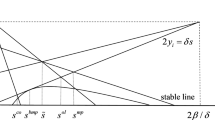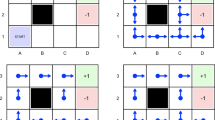Abstract
We study a discounted maxmin control problem with general state space. The controller is unsure about his model in the sense that he also considers a class of approximate models as possibly true. The objective is to choose a maxmin strategy that will work under a range of different model specifications. This is done by dynamic programming techniques. Under relatively weak conditions, we show that there is a solution to the optimality equation for the maxmin control problem as well as an optimal strategy for the controller. These results are applied to the theory of optimal growth and the Hansen–Sargent robust control model in macroeconomics. We also study a class of zero-sum discounted stochastic games with unbounded payoffs and simultaneous moves and give a brief overview of recent results on stochastic games with weakly continuous transitions and the limiting average payoffs.
Similar content being viewed by others
References
Alvarez F, Stokey N (1998) Dynamic programming with homogeneous functions. J Econ Theory 82:167–189
Başar T, Bernhard P (1995) H ∞-optimal control and related minimax design problems. Birkhäuser, Boston
Berge C (1963) Topological spaces. MacMillan, New York
Bertsekas DP, Shreve SE (1978) Stochastic optimal control: the discrete-time case. Academic Press, New York
Bhattacharya R, Majumdar M (2007) Random dynamical systems: theory and applications. Cambridge University Press, Cambridge
Blackwell D (1965) Discounted dynamic programming. Ann Math Stat 36:226–235
Brown LD, Purves R (1973) Measurable selections of extrema. Ann Stat 1:902–912
Couwenbergh HAM (1980) Stochastic games with metric state spaces. Int J Game Theory 9:25–36
Durán J (2000) On dynamic programming with unbounded returns. Econom Theory 15:339–352
Durán J (2003) Discounting long-run average growth in stochastic dynamic programs. Econom Theory 22:395–413
Fan K (1953) Minimax theorems. Proc Natl Acad Sci USA 39:42–47
González-Trejo JI, Hernández-Lerma O, Hoyos-Reyes LF (2003) Minimax control of discrete-time stochastic systems. SIAM J Control Optim 41:1626–1659
Hansen LP, Sargent TJ (2008) Robustness. Princeton University Press, Princeton
Hansen LP, Sargent TJ (2010) Wanting robustness in macroeconomics. In: Friedman BM, Woodford M (eds) Handbook of monetary economics, vol 3, pp 1097–1157
Hansen LP, Sargent TJ, Tallarini TD (1999) Robust permanent income and pricing. Rev Econ Stud 66:873–907
Hernández-Lerma O, Lasserre JB (1996) Discrete-time Markov control processes: basic optimality criteria. Springer, New York
Hernández-Lerma O, Lasserre JB (1999) Further topics on discrete-time Markov control processes. Springer, New York
Himmelberg CJ (1975) Measurable relations. Fundam Math 87:53–72
Himmelberg CJ, Van Vleck FS (1975) Multifunctions with values in a space of probability measures. J Math Anal Appl 50:108–112
Iyengar GN (2005) Robust dynamic programming. Math Oper Res 30:257–280
Jaśkiewicz A (2009) Zero-sum ergodic semi-Markov games with weakly continuous transition probabilities. J Optim Theory Appl 141:321–348
Jaśkiewicz A (2010) On a continuous solution to the Bellman–Poisson equation in stochastic games. J Optim Theory Appl 145:451–458
Jaśkiewicz A, Nowak AS (2006) Zero-sum ergodic stochastic games with Feller transition probabilities. SIAM J Control Optim 45:773–789
Jaśkiewicz A, Nowak AS (2011) Discounted dynamic programming with unbounded returns: application to economic models. J Math Anal Appl 378:450–462
Kamihigashi T (2007) Stochastic optimal growth with bounded and unbounded utility and with bounded or unbounded shocks. J Math Econ 43:477–500
Karatzas I, Sudderth WD (2010) Two characterizations of optimality in dynamic programming. Appl Math Optim 61:421–434
Kuratowski K, Ryll-Nardzewski C (1965) A general theorem on selectors. Bull Acad Pol Sci (Ser Math) 13:397–403
Küenle HU (1986) Stochastische Spiele und Entscheidungsmodelle. BG Teubner, Leipzig
Küenle HU (2007) On Markov games with average reward criterion and weakly continuous transition probabilities. SIAM J Control Optim 45:2156–2168
Kurano M (1987) Minimax strategies for average cost stochastic games with an application to inventory models. J Oper Res Soc Jpn 30:232–247
Le Van C, Morhaim L (2002) Optimal growth models with bounded or unbounded returns: a unifying approach. J Econ Theory 105:158–187
Ljungqvist L, Sargent TJ (2000) Recursive macroeconomic theory. MIT Press, Cambridge
Maitra A, Parthasarathy T (1970) On stochastic games. J Optim Theory Appl 5:289–300
Maitra A, Sudderth W (1993) Borel stochastic games with limsup payoffs. Ann Probab 21:861–885
Maccheroni F, Marinacci M, Rustichini A (2006) Dynamic variational preferences. J Econ Theory 128:4–44
Martins-da-Rocha VF, Vailakis Y (2010) Existence and uniqueness of fixed-point for local contractions. Econometrica 78:1127–1141
Matkowski J, Nowak AS (2011) On discounted dynamic programming with unbounded returns. Econom Theory 46:455–474
Mertens JF, Neyman A (1981) Stochastic games. Int J Game Theory 10:53–66
Meyn SP, Tweedie RL (1993) Markov chains and stochastic stability. Springer, New York
Meyn SP, Tweedie RL (1994) Computable bounds for geometric convergence rates of Markov chains. Ann Appl Probab 4:981–1011
Neveu J (1965) Mathematical foundations of the calculus of probability. Holden-Day, San Francisco
Nowak AS (1985) Universally measurable strategies in zero-sum stochastic games. Ann Probab 13:269–287
Nowak AS (1986) Semicontinuous nonstationary stochastic games. J Math Anal Appl 117:84–99
Nowak AS (2010) On measurable minimax selectors. J Math Anal Appl 366:385–388
Parthasarathy KR (1967) Probability measures on metric spaces. Academic Press, New York
Petersen IR, James MR, Dupuis P (2000) Minimax optimal control of stochastic uncertain systems with relative entropy constraints. IEEE Trans Autom Control 45:398–412
Puterman M (1980) Markov decision processes: discrete stochastic dynamic programming. Wiley-Interscience, New York
Rincón-Zapatero JP, Rodriguez-Palmero C (2003) Existence and uniqueness of solutions to the Bellman equation in the unbounded case. Econometrica 71:1519–1555. Corrigendum Econometrica 77:317–318
Schäl M (1975) Conditions for optimality in dynamic programming and for the limit of n-stage optimal policies to be optimal. Z Wahrscheinlichkeitstheor Verw Geb 32:179–196
Shapley LS (1953) Stochastic games. Proc Natl Acad Sci USA 39:1095–1100
Stokey NL, Lucas RE, Prescott E (1989) Recursive methods in economic dynamics. Harvard University Press, Cambridge
Strauch R (1966) Negative dynamic programming. Ann Math Stat 37:871–890
Wessels J (1977a) Markov programming by successive approximations with respect to weighted supremum norms. J Math Anal Appl 58:326–335
Wessels J (1977b) Markov games with unbounded rewards. In: Schäl M (ed) Dynamische Optimierung, Bonn, 1977. Bonner Mathematische Schriften, vol 98, pp 133–147
Author information
Authors and Affiliations
Corresponding author
Rights and permissions
About this article
Cite this article
Jaśkiewicz, A., Nowak, A.S. Stochastic Games with Unbounded Payoffs: Applications to Robust Control in Economics. Dyn Games Appl 1, 253–279 (2011). https://doi.org/10.1007/s13235-011-0013-8
Published:
Issue Date:
DOI: https://doi.org/10.1007/s13235-011-0013-8




